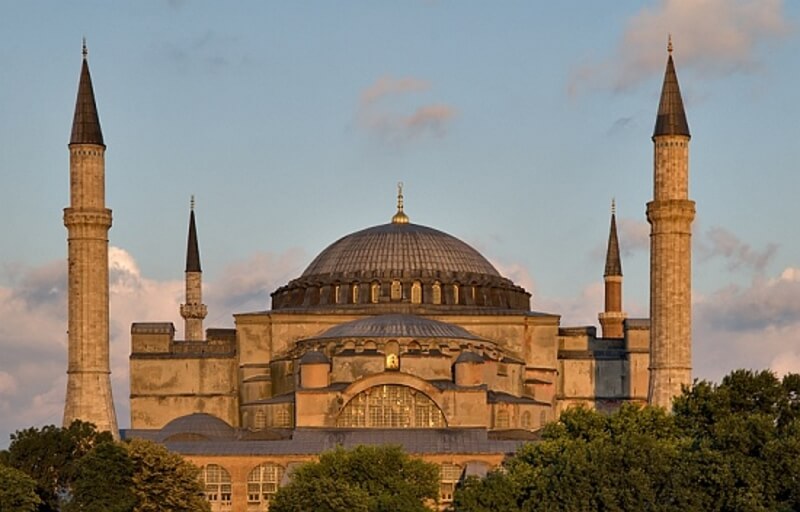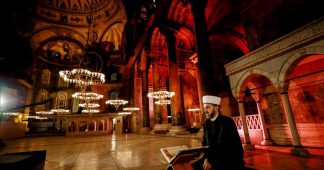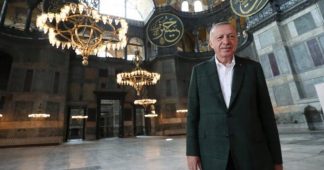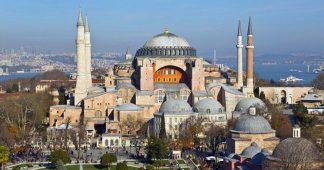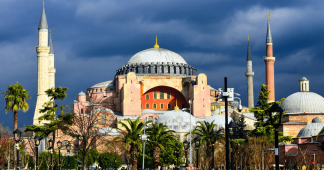Ezgi Başaran writes: French political scientist Professor Olivier Roy, who, since the mid-‘90s, has argued that the Islamist project has failed, says Atatürk’s secularism won in Turkey. While analyzing President Erdoğan’s decision to reconvert Hagia Sophia to a mosque, Roy argues that Erdoğan could not Islamize minds, so he is trying to Islamize stones.
By Ezgi Başaran
July 21 2020
Turkey’s hectic daily politics sometimes muddles our minds and impedes us from interpreting significant developments from a wider perspective. I am afraid the reconversion of the Hagia Sophia to a mosque might be one of those developments that has now been now lost in the messy conversation. For a broader perspective, I talked to French political scientist Professor Olivier Roy, who, since the mid-‘90s, has argued that the Islamist project has failed. He claims that the main tenets of the Islamist project – the building of an Islamic state, the shariaisation of the constitution – have little appeal for ordinary Muslims nowadays. Why?
According to Roy, the generation fascinated by or interested in Islamism consisted of people who were young in the ‘80s and early ‘90s. Before them, nationalism was the dominant ideology, led by [Gamal Abdel] Nasser in Egypt and the Baath Party in Syria and Iraq. Congruent with nationalism, there was also Islam’s all-encompassing view of society. For example, the Baath Party was secular, but it also embraced Islam’s holistic view of society. In addition to this, starting in the mid-20th century, there was a specific political culture that revolved around charismatic leaders, such as Nasser, Khomeini, and Saddam Hussein. This political culture is now dead among the new generation. We witnessed that the so-called Arab Spring was not ideological and not led by charismatic leaders.
Even though Roy acknowledges Erdoğan as a charismatic leader, he believes Erdoğan belongs to a passe political culture: “Many people who are rooting for him were young in the ‘80s. Now Erdoğan is an elderly man, so are his main rooters. Erdoğan is driven by this old political culture, which is clearly illiberal and has lost its appeal. In the beginning, the AKP was successful as long as the economy was going well. It was clear that the AKP pursued the right economic program, but that program was initiated just before it assumed power. However, it was clever to follow that program and the developmentalism that was manifest in building new roads and facilities, not only in big cities but also in the countryside – in Anatolia. If you compare 1990s Turkey to, say the Turkey of 2010, you will see a total modernization in terms of services. Therefore, many Anatolians voted for the AKP because the AKP symbolized economic and social promotion. However, now, even among AKP voters, there emerged a certain degree of secularism, which led to resisting more Islamization in their hearts and minds. In Turkey, the debate on Islam, which was led by Islamist intellectuals in the 1990s, has vanished. You do not have that anymore.”
For Roy, there are two reasons why there is no such heated debate on Islam in Turkey: “Firstly, those intellectuals are sidelined and expelled out of the game by a government that once was believed to be Islamist. Secondly, Turkey is – sociologically speaking – a defacto open society. There are, of course, small groups of Islamists hardliners; however, the majority of ordinary people in Turkey do not care much about Islam. Another important point is that the AKP never had control of the wide religious networks. The professional religious cadres used to be provided by its now arch-enemy, the Gülen movement. The botched coup dealt both a psychological and political blow for Erdoğan, as he was proven right about being betrayed by Gülenists. The reprisal of Erdoğan in the aftermath of the coup against religious and political networks also meant that he lost the grip of even the Imam Hatips and mosques in Europe, Asia, and Africa because the AKP by itself does not have the means to control those networks, even though it tries hard. Besides, Erdoğan lost his grip on the economy. He lost the technocrats like Ali Babacan and the liberal wing. The AKP could not fulfill the Islamists’ biggest promise about being against corruption. Exactly for these reasons, Erdoğan is only left with symbols as tools for consolidating the electorate. In that sense, what better symbol than converting the Hagia Sophia to a mosque. Erdoğan could not Islamize minds, so he is trying to Islamize stones. That is the punchline of the Hagia Sophia conversion.”
Major scholars of Islamist behavior, such as Asaf Bayat, John L. Esposito, Francesco Cavatorta, François Burgat and Roy himself, have argued that the emergence and tenure of the AKP are perfect examples of post-Islamism (as referenced by Bayat) which, crudely, means abandoning certain underlying principles of Islamism, such as making sharia the base of the constitution. Post-Islamism is an academic framework, and how this framework applies in practice is ambiguous. I wondered how Roy would explicate on this when looking at the journey of the post-Islamist parties such as the AKP, Ennahda in Tunisia, or the PJD in Morocco. According to Roy, there is no explanatory value in looking at today’s AKP as “today the AKP is Erdoğan, nothing more.” He went on to say: “However, Abdullah Gul and Ahmet Davutoğlu were perfect examples of post-Islamism because they had understood the failures of the Islamist project and transformed their political practices accordingly. Erdoğan, on the other hand, did not get the post-Islamist current within the society and the movements.”
The leaders of Tunisia’s Ennahda, on the other hand, “realized that sticking to an Islamist agenda will not work in Tunisia.” Another critical point is that Ennahda has many women within the party’s institutions and decision-making bodies: “Many of those women are the daughters of the older generation Nahdawis. For example, even though they wear the veil, Ennahda’s female politicians do not support the traditional family and societal system that binds women to households. We see a similar case with Moroccan women who work for and around the PJD. So, the second generation of Islamic or Islamist women is the pivotal force behind the transformation of the Islamist project and its evolution towards post-Islamism. Going back to Ennahda and Ghannouchi, there is not much left in terms of Islamic-ness in their standing. For example, nowadays, there is the trial of the Tunisian blogger who made jokes about Islam. Who is constantly attacking that blogger [Emna Chargui] and wants her to be punished? Not Ennahda but the state itself. Who is attacking the homosexuals in Morocco? Not the PJD but the state, the monarchy. While the mainstream Islamists keep silent, states repress the feminists and LGBT people. It is still the state apparatuses with authoritarian backgrounds that aspire to control the society by using conservatism.”
Why do Islamists keep silent? “Because they do not have anything to offer, nothing to propose, nothing to put on the table,” says Roy. “They cannot become a liberal leftist party. They do not want to be seen as socially conservative to still have a chance with the youth. Their religious arms are mainly broken because it is the state that controls the mosques. The imams do not want to be controlled by a political party either.”
If this is the case, one wonders, how and why do quite a considerable part of Moroccan, Tunisian and Turkish people vote for these Islamist parties?
“There is a portion of the societies that opt for traditional conservative parties,” Roy admits. “For those constituencies, what is left of the Islamist parties is okay and enough. These parties play the parliamentary game, which means they are not calling for jihad or sharia. Their program is not Islamization, but re-traditionalization of the society, and that appeals to certain segments of the societies.” However, according to Roy, there is a palpable shift in the Islamists’ narrative: “For example, according to Ennahda, it is not the politics or the society that should be Islamized, but Islam should be connected to Tunisian identity. So, people are acting not in the name of the Quran but the name of traditions. This concept is similar to Turkey. The AKP’s constant reference to the Ottoman era is an attempt to ‘civilize’ the Islamist discourse in domestic politics.” Roy also claims that the constituencies of mainstream Islamist parties in the Middle East – especially in the Maghreb – are in a phase of slow secularisation. By secularisation, he means that people have embraced the idea that religion is a private matter:
“For example, there is a movement in Morocco that says if you want to fast you fast, but if I do not fast, I have no reason to hide. In Tunisia, during Ramadan, the restaurants are now open in bourgeois regions and keep serving outdoors. In Algeria, the HIRAK movement behaves like a secularist party. You cannot find one Islamic slogan in their repertoire. It is fascinating because 20 years ago, if there were a movement like Hirak, it would have been dominated by Islamists or by an Islamist spirit or slogans. Again, looking back at last year’s protests in Algeria, you see hundreds of thousands of people on the street, not one Islamic slogan. Because they do not believe in the old generation of Islamists, that is what I call the failure of Islam.”
“The AKP is not a Middle Eastern movement, and that is a problem for Erdoğan,” Roy says. “In this sense, Atatürk won. Turkey is Western and European in the bigger approach, which includes Russia. This is a big problem for Erdoğan because the only card he can play is the Ottoman card and it does not work. The Arabs do not want the Turks to come back. The Ottoman card is totally discredited in the Middle East. For example, if the Libyan government agreed with Turkey, it is only because Turkey is providing it with weapons and money. While Erdoğan presents this relation as Ottoman patronage, it is a simple state-to-state transaction which is not popular among the Libyans. The Tripoli government looks at its options and sees that there is only one reliable ally, and that is Turkey. So, they take what Erdoğan provides them. However, the narrative of Erdoğan, the Ottoman narrative, they do not buy.
Another important point is that Turkey is not an Islamic society. In that sense, on top of Atatürk, secularism also won. Even though the majority of the Turkish population claim to be practicing Muslims, they do not want Islam to be the primary driver of legislation and society.”
How does Roy evaluate the close relations of the AKP with Islamist non-state actors in Syria and Libya, Ennahda in Tunisia, or the Egyptian Muslim Brotherhood? He says he believes that “these relationships only prove that Erdoğan has an Ottoman dream. To fulfill this dream, Erdoğan needs indigenous tools, and that is what the partnerships in Tunisia, Libya, Syria, and Egyptian MB provide. However, these tools do not work exactly how Erdoğan had strategized they would because, for example, Ghannouchi is a Tunisian actor and a patriot. Just because the Arab Islamist actors are happy to receive Turkey’s support does not mean they are ready to diminish their national sovereignty for Erdoğan’s Ottoman dream.” In a similar vein, Roy sees a significant miscalculation in the reconversion of the Hagia Sophia to a mosque because it is an Orthodox Church. Putin’s policy has been to be the defender of Orthodoxy. Therefore, the Hagia Sophia’s conversion is a big blow to Russia, who seems to be Turkey’s only partner in volatile theatres like Syria and Libya. So, Erdoğan dealt a blow to Putin rather than the Pope. The second miscalculation comes from overlooking the dialogue between Muslims and Christians. For the last couple of years, this dialogue has been led by Arabs, and was initiated in Abu Dhabi, where the Pope had visited in 2019. I was there and witnessed the meeting of the two Crown Princes and Al-Azhar Mosque’s imam with the Pope. That day, a Christian church was opened in the United Arab Emirates, and the Pope led a mass. It is ironic that while Gulf countries open up to Christians, Turkey is closing down.”
As this interview proves once more, Roy still adamantly supports his two-and-a-half-decade-old claim that political Islam has failed. “It is not a surprise that I still support my argument,” he says. “What is interesting is that the Islamists themselves have acknowledged my argument that political Islam has failed. Now the debate within academia is that many of my colleagues argue that the Islamists act purely for pragmatic reasons, but in fact, they are still Islamists in their minds. My view is that we should not care about what is on their mind. First, because there is no way to determine what is on somebody’s mind scientifically. Second, because what matters is their actions.”
